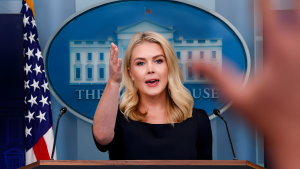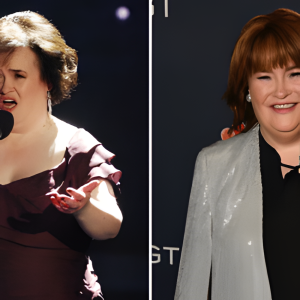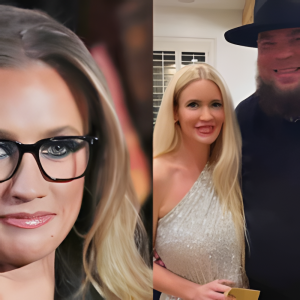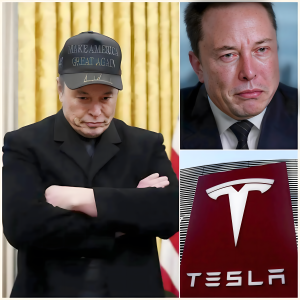The Ed Sullivan Theater became the unexpected epicenter of a political firestorm when conservative commentator Karoline Leavitt made a headline-grabbing appearance on The Late Show with Stephen Colbert. What began as a typical segment of satirical banter quickly unraveled into a tense, unscripted ideological showdown that caught even seasoned viewers off guard.
Colbert, known for his progressive humor and quick wit, may have anticipated a sparring match. What he didn’t expect was for Leavitt to seize control of the narrative — and the stage — with unflinching defiance.
“If You Want Comedy, Steven…”
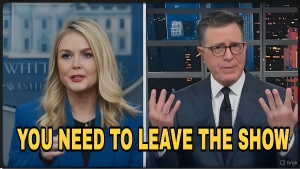
From the opening exchange, the temperature in the room changed. After a light jab at Leavitt’s political style, Colbert’s audience chuckled. But Leavitt’s steely response silenced the laughter:
“If you want comedy, Steven, go ahead. But I came here to talk about real issues that matter to Americans.”
With that, the tone of the interview shifted. Leavitt challenged the show’s portrayal of conservative voices, accused the media of stifling dissent, and confronted what she called “the liberal bubble of late-night television.”
Colbert attempted to steer the conversation back to satire. But Leavitt wasn’t budging.
The Trump Flashpoint
Things escalated when Colbert invoked Donald Trump, a frequent target of his monologues. But instead of taking the bait, Leavitt leaned in:
“You can mock him all you want, but millions of Americans saw their lives improve under his leadership. You laughed, but they’re still struggling today.”
The comment landed like a grenade. Silence swept the room.
Colbert, clearly surprised, pivoted to topics like pop culture and current events. But Leavitt brought it back to inflation, crime, and border security, bluntly stating:
“People aren’t laughing at their grocery bills. They’re not entertained by fentanyl in their schools.”
Control Slips, Then Breaks
When Colbert tried to challenge her sincerity, asking, “Do you really believe all of this, or is it political theater?” Leavitt didn’t blink:
“It’s not theater when you’re living paycheck to paycheck, Steven. Maybe that’s hard to see from inside a Manhattan studio.”
Audience murmurs grew. Tension was palpable. Then, suddenly, a producer appeared on stage, whispered in Colbert’s ear, and the segment abruptly cut to commercial.
Leavitt stood, looked Colbert in the eye, and delivered a parting shot:
“Maybe next time, invite someone you’re actually willing to listen to.”
The Internet Erupts
Within minutes, #LeavittVsColbert was trending. Clips went viral. The polarized response was instant: some called Leavitt fearless, others accused her of hijacking a comedy platform for political grandstanding.
The Late Show issued a brief statement citing “time constraints” for the shortened interview. Leavitt’s team responded, accusing the show of cutting her off for being too blunt.
Fallout and Aftershocks
The fallout was immediate. Leavitt was hailed across conservative media as a bold truth-teller who refused to be boxed in. Colbert, meanwhile, addressed the incident with dry humor in a later episode:
“Sometimes the truth walks in with a smile—and walks out flipping the script.”
But behind the laughter was a clear sense that the moment had struck a nerve. It wasn’t just an uncomfortable interview. It was a cultural flashpoint.
More Than Just a Viral Clip
The confrontation encapsulated a deeper tension in American media: the divide between ideological worlds that rarely meet — and often clash when they do. To Leavitt’s supporters, it was a victory against elite media. To Colbert’s audience, it was a disruption of the show’s intended format. But to many observers, it symbolized something bigger: the erosion of shared spaces where disagreement can unfold with civility.
Final Takeaway
The clash between Karoline Leavitt and Stephen Colbert wasn’t just late-night theater — it was a reflection of the shifting media landscape. In a space designed for scripted satire, a live confrontation upended expectations and sparked a national debate.
For Leavitt, it marked a career-defining moment. For Colbert, it served as a reminder that control is never guaranteed when real confrontation walks onstage.
Two voices. One stage. Zero filters. And a nation still debating what just happened.
